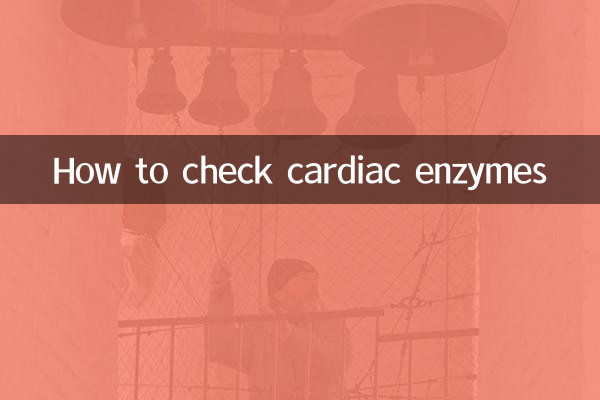How to check cardiac enzymes
Myocardial enzyme examination is one of the important indicators for diagnosing myocardial damage, especially in the diagnosis of acute myocardial infarction, myocarditis and other diseases. This article will introduce in detail the testing methods, clinical significance and related precautions of cardiac enzymes, and provide you with structured data reference based on the hot medical topics on the Internet in the past 10 days.
1. Clinical significance of cardiac enzyme examination

Cardiac enzymes are specific enzymes released into the blood when myocardial cells are damaged, mainly including creatine kinase (CK), creatine kinase isoenzyme (CK-MB), troponin (cTnI/cTnT), etc. By detecting the concentrations of these enzymes, it can be determined whether the myocardium is damaged and the extent of the damage.
| Cardiac enzyme type | normal reference value | clinical significance |
|---|---|---|
| Creatine kinase (CK) | Male: 38-174 U/L Female: 26-140 U/L | Elevated levels suggest cardiac or skeletal muscle damage |
| Creatine kinase isoenzyme (CK-MB) | 0-24U/L | High specificity, mainly used for diagnosis of myocardial infarction |
| Troponin (cTnI/cTnT) | cTnI<0.04 ng/mL cTnT<0.1 ng/mL | The most sensitive marker of myocardial injury |
2. Common methods for cardiac enzyme examination
1.Venous blood test: This is the most common method of testing cardiac enzyme levels by drawing a venous blood sample.
2.Rapid test (POCT): Some medical institutions provide point-of-care rapid testing, with results available within 15-30 minutes.
3.dynamic monitoring: For patients with suspected acute coronary syndrome, repeated testing is usually required at 2-4 hours intervals.
| Check method | advantage | shortcoming |
|---|---|---|
| Venous blood collection | Accurate results and can detect a variety of indicators | Requires laboratory equipment and takes a long time |
| POCT rapid test | Quick and convenient, suitable for emergencies | Detection indicators are limited and accuracy is slightly low |
3. Precautions for cardiac enzyme examination
1.Check timing: Myocardial enzymes begin to increase 4-6 hours after myocardial injury and reach the peak at 12-24 hours. Therefore, examinations need to be arranged reasonably according to the time of symptom onset.
2.Influencing factors: Strenuous exercise, intramuscular injections, and certain drugs may affect CK levels. These interfering factors should be avoided before examination.
3.Interpretation of results: Comprehensive judgment needs to be combined with clinical manifestations, electrocardiogram and other examinations, and diagnosis cannot be made solely based on cardiac enzyme results.
4. Recent hot medical topics and myocardial health
According to the hot spot monitoring on the entire network in the past 10 days, the following topics are closely related to myocardial health:
| hot topics | Relevance | Discussion popularity |
|---|---|---|
| Young people at increased risk of sudden death | high | ★★★★★ |
| Early recognition of myocarditis | Middle to high | ★★★★ |
| Heart Health Checkup Item Selection | middle | ★★★ |
5. Frequently Asked Questions about Cardiac Enzyme Testing
1.Q: Does the cardiac enzyme test require fasting?
Answer: Strict fasting is generally not required, but it is recommended to avoid high-fat meals before the examination.
2.Question: Is elevated cardiac enzymes necessarily a sign of heart disease?
Answer: Not necessarily. Skeletal muscle injury, strenuous exercise, etc. may also cause CK to increase. Judgment needs to be combined with other examinations.
3.Question: How long does it take to get the results of myocardial enzyme test?
Answer: Routine examination takes about 2-4 hours, and emergency rapid test takes about 15-30 minutes.
6. Lifestyle suggestions for healthy heart muscle
1. Maintain a regular schedule and avoid overexertion
2. Eat a balanced diet and control salt and fat intake
3. Moderate exercise to enhance cardiopulmonary function
4. Regular physical examinations, especially for people with a family history of cardiovascular disease
5. Learn to recognize symptoms of heart discomfort such as chest pain and seek medical treatment promptly
By understanding the relevant knowledge of cardiac enzyme testing, we can better pay attention to heart health and detect potential problems early. If symptoms such as persistent chest pain and difficulty breathing occur, you should seek medical examination immediately.

check the details

check the details